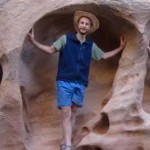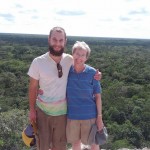Are you a Cottonwood alumnus? We’d love to hear from you! What are you up to? Email Us!
We recently had the opportunity to reconnect with Brian Fauver, a Cottonwood Institute alumnus. Even as he enters a graduate degree program, he continues to use the problem-solving, critical thinking, and leadership skills he gained through CAP. Keep reading to learn how CI continues to impact Brian as a student, professional, and outdoor-connoisseur.

Here’s Brian, exploring Crack Canyon in Utah.
I am working two seasonal jobs: the first at the Denver Zoo, which is during the summer and fall. I help out with the Front Range Pika Project, which is a Citizen-Science project. The organization trains volunteers to collect data on pika habitat over time. I also work at the Natural Resource Ecology Lab at CSU, where I will be pursuing a graduate degree in the fall. My work there is about Citizen-Science, or Public Participation in Scientific Research/Community Based Monitoring. More specifically, I research the cultural differences in effectively managing a successful Citizen-Science program.
What do you remember most about your Cottonwood Institute (CI) experience?
I remember being a part of the CI community. After taking three CAP courses at New Vista High School in Boulder, I soon became at CI intern. While an intern, I went as a student on an Instructor Training overnight. I enjoyed looking at the organization from the several different perspectives: as a student, and as someone giving feedback.
What are the coolest skills you’ve learned from CI that you’ve been showing your friends or family?
Winter camping. Quinzees. And of course, friction fires.
How has your CI experience helped you create positive change in your community?
Before I took CAP, I wanted to help out with environmental conservation. I had interned at both the Sierra Club and The Nature Conservancy. I couldn’t help feeling overwhelmed with my inability to change large national/regional scale problems. Taking CAP helped introduce me to the idea of local change and community organizing. This seemed like a much more attainable model.

Brian and his mother in Mexico.
Based on your CI experience, what piece of advice would you like to give to other students?
Since I took three different CAP courses, looking back, it is evident how much more effective the action projects that were group-inspired (rather than individually-inspired) were.
Try not to be too ambitious. Think big, but enact small tangible changes.
Thanks Brian!
Edited by Katie Craig


Leave a Reply